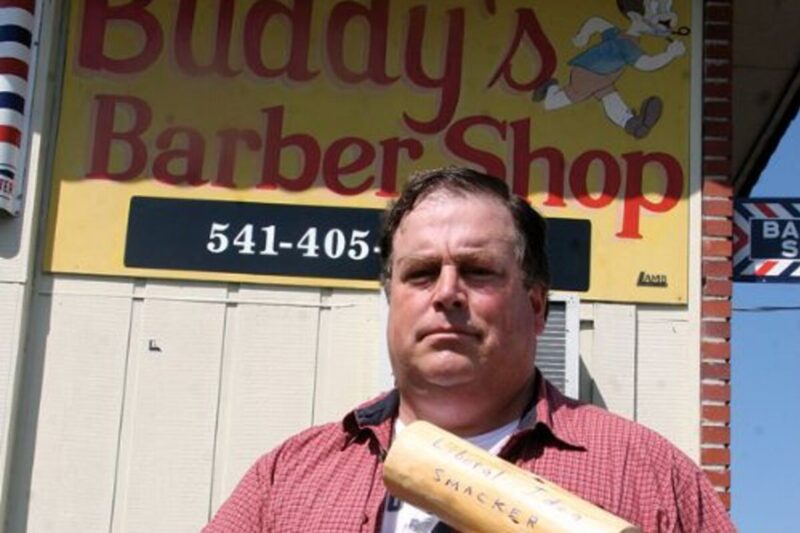Sean C. Morgan
Bruce Cuff has announced his candidacy for governor in 2014 and he kicked off his campaign in Sweet Home.
Armed with a “liberal idea smacker,” a flannel-clad Cuff made the announcement in front of Buddy’s Barber Shop on Long Street on July 14, Sportsman’s Holiday, and the birthday of his late father, Roy Cuff, a barber who would have been 77.
“Enough is enough, it’s time for Bruce Cuff,” he said.
Cuff, a real estate agent from Lyons, ran twice against incumbent Rep. Sherrie Sprenger for House District 17 in the Republican primary after Sen. Fred Girod moved to the state senate.
Oregon has a governor who has insulted the state, Cuff said. “He said Oregon was ungovernable.”
“The reason I’m running is I’m tired of people ripping on Oregon,” Cuff said. “Oregon is the best state. I am sick and tired of John Kitzhaber standing in Oregon saying Oregon is ungovernable. He needs to go home. Why would you vote for this guy again?”
Cuff said he believes Oregonians are individualistic and entrepreneurial, though they do need leadership.
“We don’t like to be told what to do, and they’ve been telling us what to do,” Cuff said.
And, Cuff said, he is the “Tea Party Guy” to do it.
“I’ve got a million ideas, and together, we can fix it. I’m hoping to fix a lot of things in the state.”
Among them are the salmon fisheries.
California sea lions are one of their problems, he said. The state needs to turn to scientists for a re-commendation on how many to kill and turn into Oregon products.
“There’s too many of them,” Cuff said. Their population needs to be reduced to a more eco-friendly number.
He tried to go fishing for flounder in Newport, Cuff said, and the folks there laughed at him because the sea lions eat all the fish. While crabbing, the sea lions jump and take the crabs out of the nets.
Cuff wants to reduce the income tax rate from 9 percent to 4 percent and the corporate excise tax from 6.6 percent to 4 percent over 10 years and repeal measures 66 and 67, which created a tax on businesses’ gross revenue and increased taxes on households earning more than $250,000 or individuals earning more than $125,000 per year. The voter-approved measures were referred to the voters by the legislature and governor.
“We have a long-term plan of making Oregon become the least-taxes state from one of the most-taxed,” Cuff said.
Cuff wants Oregon’s roads modernized, like many European transportation systems, with roundabouts installed and stop signs removed so traffic rarely has to stop moving, he said. The roads need to be fixed anyway.
That will actually decrease pollution, Cuff said. “Sitting and idling, that’s when you’re smogging things up.”
Oregon needs to get its natural resource base back into balance, Cuff said. One place to start is the burned forestland in the wilderness around Marion Lake. He wants to send a crew of inmates there with loggers and guards to cut it down, turn it into firewood and replant it. It’s been there too long to salvage, but it can still be used, and the forest replanted to restore its natural beauty.
In education, Cuff wants to create a voucher system to introduce the benefits of competition. The state will pay half of whatever it pays districts per student to parents for use in education, creating an incentive to reduce spending while reimbursing home schools and private schools for their expenses.
He would cut the governor’s salary 20 percent immediately, Cuff said.
State salaries should not exceed two times the average pay in Oregon, he said, and he would aim to cut supervisor salaries to that level. If the average pay is around $35,000, then the state limit would be $70,000 per year. He doesn’t want to touch the rank and file, which are under contractual obligations.
“As Oregon prospers, the people in the public sector prosper,” Cuff said, so when the economy and the people suffer, state employees suffer the same way, connecting their prosperity to the rest of the state’s citizens.
That’s how retired public employees can receive the benefits of a 20-percent return even when they lock in on an 8-percent guarantee, Cuff said. “They made a mistake. That’s because everyone making decisions is in the PERS system.”
Legislators and judges, elected officials, must be removed from the Public Employees Retirement System, Cuff said. They’re in PERS, and they’ve been making senseless decisions managing the system and its liabilities. Elected officials should have a 401(k) instead.
The state is facing difficulty paying for PERS, but it could cover the cost, Cuff said, as long as it gets the private sector going again.
“We can do that if we lower taxes,” Cuff said.
Cuff’s website is time4cuff.com.





